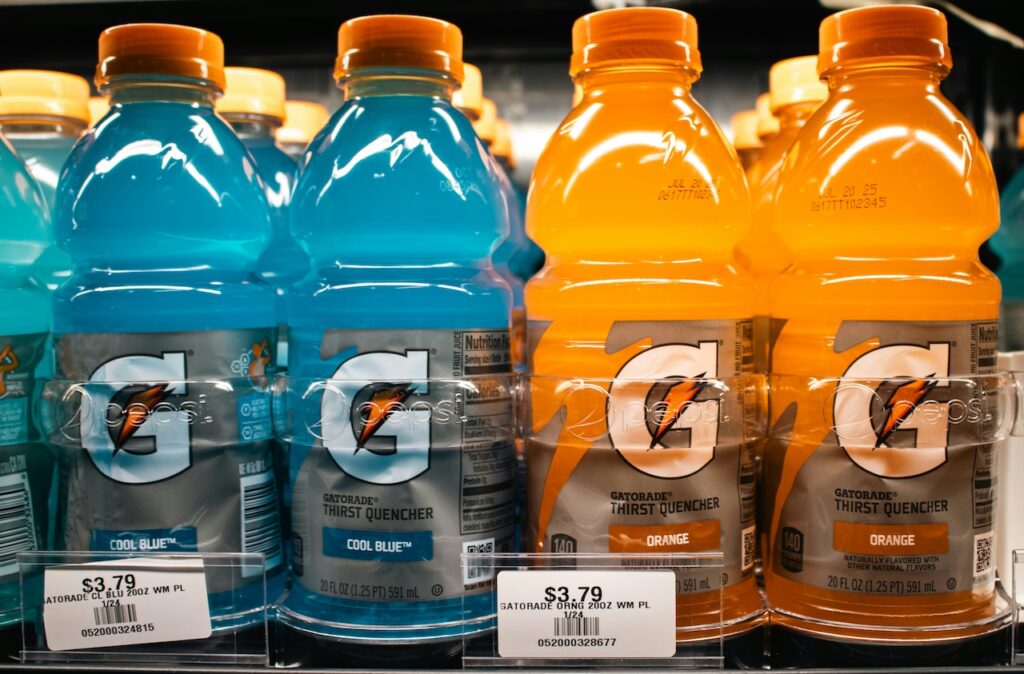
The sports drink. Woven into America’s youth sports culture, much like fruit gummies and Cheetos. The overconsumption and misuse of sports drinks is very common among all youth sports, with many parents providing as a suitable substitute for water. It has its place, but it’s not always needed.
If you’ve asked yourself — does my child need a sports drink? — keep reading.
Let’s talk about what a sports drink is.
The original sports drink Gatorade was developed at the University of Florida to help athletes combat the heat with multiple workouts and to make it through games. They found that a combination of hydration, electrolytes, and carbohydrates (sugar) provided an enhanced nutrient profile that water alone could not match.
It is considered a supplement because it is not part of the typical diet. and you can get those nutrients from food. It’s meant for athletes participating in high sweat environments, not novice exercisers. Because sports drinks are so commonplace, many young athletes may not be aware that often they don’t need one.
When Are Sports Drinks Appropriate for Young Athletes?
So, how can you tell if your athlete needs a sports drink? There are a couple of things to look out for when deciding to have them consume a sports drink.
- Exercise over 60 minutes. One hour is the threshold for when a sports drink may help replenish the body faster than drinking just water.
- Hot and humid conditions. This is going to take some parent and coach involvement, but if your athlete is practicing or participating in games, meets, or matches when the temperature and/or humidity is high, their sweat rate will be higher, regardless of the time. You should also try and determine whether or not the athlete is a heavy sweater. If there are white rings when sweat soaked clothes are dry, you can be sure they are a heavy sweater and are losing electrolytes, such as sodium.
- To hydrate quickly. There are times when young athletes will not drink water for hydration, but they will drink a sports drink. If you know the athlete has a quick turnaround for practices, meets, or games, then a sports drink may help with their hydration to help them recover faster. A good practice for this, is to cut the sports drink with water, so they are still getting the taste, just not as much sugar.
If you consider yourself a sports parent, then you have probably experienced the obligatory snack after an hour long practice for a young baseball or soccer player when it is obvious that they did not exert much effort. If you’re guilty of this, then rewind a little and stick with water if the athletes don’t fall into one of the 3 categories above.
As a parent or coach, it is your responsibility to teach proper use of sports drinks so the use is not abused. Recently, more nutrients have been added to sports drinks to make them more “functional”. Be careful with these. Stick with the intended use, be smart about why they are used, and remember they are not a drink for everyday consumption for most young athletes.
Hydration Choices
For every child during and after activity lasting 60 minutes or less:
Water or flavored water
For 60+ min of activity, hot and humid conditions, or heavy sweating:
12 ounce sports drink
Water with electrolyte packet (should include sodium, potassium, and carbs)
To provide hydration plus protein after workouts:
14 ounce Low-Fat Chocolate Milk
8-ounce protein drink
The Bottom Line
Sports drinks are not intended to be used every day as a casual drink. They are intended to replenish three things: fluid, carbs, and electrolytes. Stick to plain sports drinks like Gatorade or Powerade and don’t feel the need to buy sports drinks that add anything extra like creatine or amino acids. Teach responsible use of sports drinks that you buy at the store, or make your own at home.
